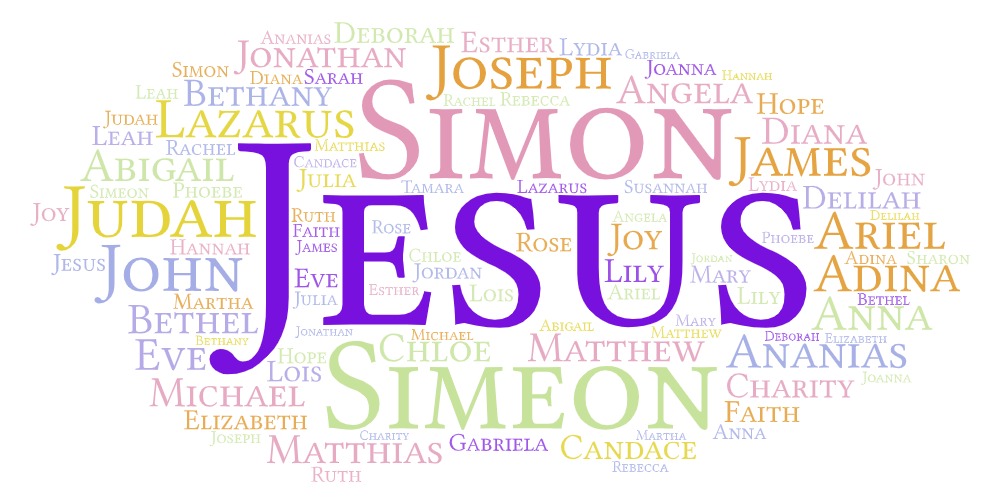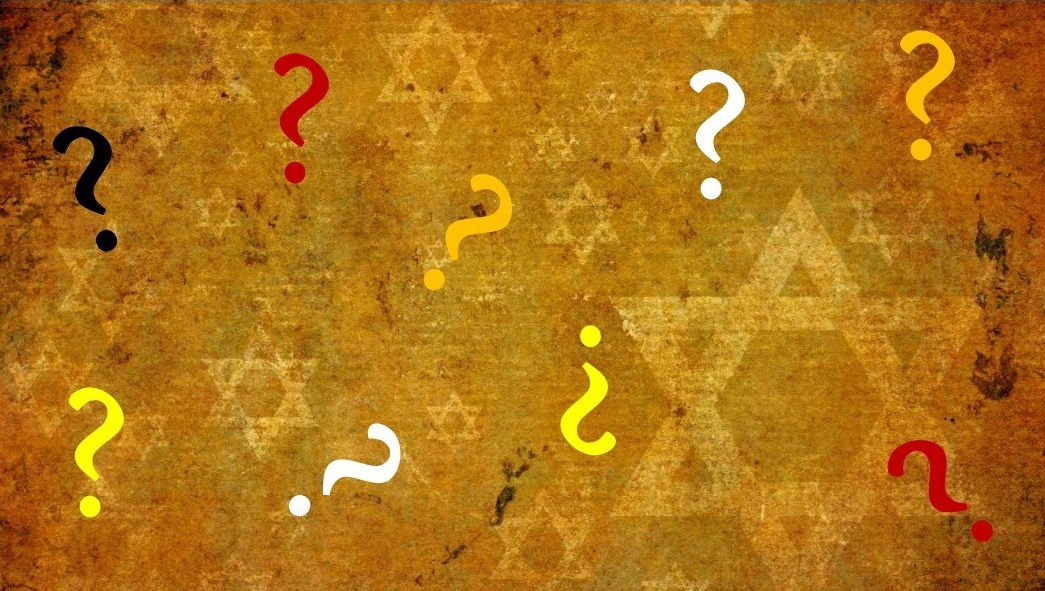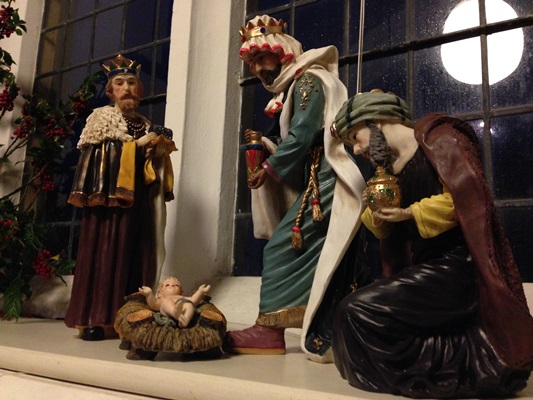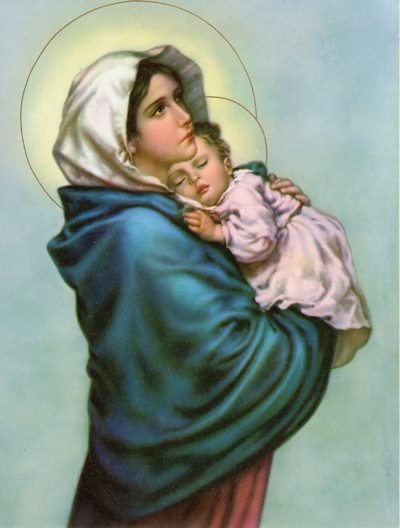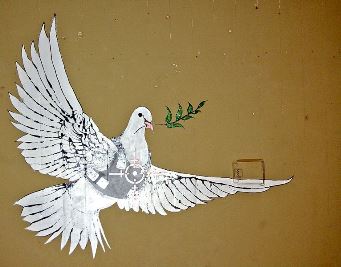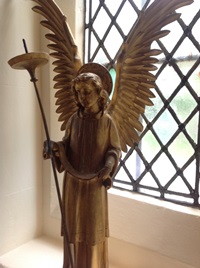
Shoah – an obliteration of potential
A sermon preached on Candlemas, honouring Holocaust Memorial Day 2018, based on Luke 2:22-40
May I speak and may you hear, through the Grace of our Lord, Father, Son and Holy Spirit. Amen
A Jewish family… mother, father and precious new born baby son… entering the temple in Jerusalem, some 33 to 40 days after his birth, to fulfil a rite of passage required under the law of Moses; the purification of his mother with a simple offering, for those without wealth or status, of a pair of turtle doves or young pigeons.
Three people learning what it means to be a family, with little or no inkling of what life lies ahead of them, but filled with dreams and aspirations of what their son may grow up to be. Maybe for Joseph, a son to follow in the family tradition, to become a skilled carpenter working alongside him, and for Mary, a child who will grow up strong and healthy, perhaps achieving far greater things than his parents had by becoming a rabbi or priest.
We have to remember that this was taking place quite some time before three strangers from the East would turn up on their doorstep, with their unusual gifts, and a warning in a dream that would cause the family to flee across the border into Egypt. And yet the season of Epiphany draws to a close today with this story of Simeon revealing the poignant potential Jesus is destined to fulfil.
A potential that was to bring salvation for those who believe in him, both to Jews and Gentiles at the expense of those who would oppose him, , ‘I came that they may have life, and have it abundantly’. A potential that is offered to each and every one of us, to every child that is born. A potential that is to be nurtured and encouraged whatever shape or form it may take. A potential that can be torn away, stamped on and destroyed.
‘I came that they may have life, and have it abundantly’
John 10:10
Yesterday was Holocaust Memorial Day, a day set aside from our November Remembrance Day; when we remember those who fought and gave their lives not only in the 1st World War but also in the 2nd World War, where they stood up aside the evil tyranny of the Nazi regime. Holocaust Memorial Day is a special day to remember the six million Jews as well as other victims, who were murdered simply because of their religion, race, disability, or sexual orientation, bringing the total nearer to eleven million lives.
As a dry statistic, eleven million people is probably unimaginable, but imagine that you drove to the outskirts of London and suddenly the roads, houses and buildings were empty, deserted, every single place, right into the centre of the city. Everyone had disappeared, leaving behind most of their possessions, gone without a trace. Not a single living person remaining.
For the Jews living in Nazi occupied countries, these disappearances were happening in every city, town and village. The streets were falling silent, no one rushing about their daily business, no children playing in streets or shouting and laughing in parks and playgrounds. For among those six million almost a quarter of them were children, 1.5 million lives. Children who never got the chance to grow up and fulfil their potential or their dreams for the future.
Those six million people who were not born as victims, but who had their hopes and dreams brutally stripped away because of an ideology that condemned them to death just because they were Jewish.
Some of you will know that late last year I undertook a ten day seminar at Yad Vashem in Jerusalem, where they not only educate people about the events and the peoples of the Holocaust or Shoah, as they prefer to call it, but also strive to preserve the memories and stories of the victims. Their photographic archive contains hundreds of photographs of Jewish people; people who smiled, danced, took part in sports and musical events, got married and enjoyed holidays and family occasions; with no awareness of the fate that awaited them; each now frozen in time for posterity, as the camera captured their everyday lives.

There are also photos of beloved children, dressed up and posed in their Sabbath best, no different I doubt to the snapshots we have, brought out years later to embarrass our offspring, except these children would face no future embarrassment.
This recognition of unfulfilled hope is echoed in another part of the site, where the Children’s Memorial has been created by hollowing out an under underground cavern, which has its own symbolism. It is entered by a descent that funnels you into a darkened room. In the gloom the images of several unnamed children stare out from photographs, as the sound of a mournful lament softly plays.
Then further down, feeling your way into the darkness, you enter what appears to be a room filled with stars. The effect is created by just five candles, which are replaced each day, reflected by mirrors to produce an infinity of tiny lights. In this twilight we listened to just a few of the names of some 1800 of the children, their ages and where they were from; a representation of stolen lives. It is very moving and I immediately thought of my own children
But it is the photographs that haunt me because it makes these children more tangible, and despite not knowing their names, they are no longer anonymous. In your service sheet is a slip of paper with some photographs on it, take a look at it now [see below].

Florika Liebmann, Unknown and Raphael Altmann
On the left is Florika Liebmann. She was born in 1934 in Szeged, Hungary to Bela and Szenka Liebmann. Bela was a Jewish photographer and businessman who ran an optical and photographic supply store, as well as doing photography in local theatres. During World War Two, he was conscripted into the Hungarian labour service. Szenka and Florika were deported, and in April 1945 were killed along with 38 other victims, in the village of Weissenbach by retreating SS soldiers.
On the right is Raphael Altmann. He was born in 1937 in Wilmersdorf, Germany to Kurt and Grietje Altmann. He was the oldest of four children, including his brothers Martijn and Fred. During the German occupation, the family was expelled to Zeist, in the Netherlands, from where they went into hiding in late 1942. When they could no longer stay together, the parents gave their two older children to a children’s house in Zeist. The house had an escape procedure, but in real time things went wrong. The headmistress was arrested with the children and sent to the Westerbork camp. The children were sent from this camp on to Auschwitz, where they perished on 26 March 1944. Kurt and Grietje, however, hid in four different places with their youngest son Fred and managed to survive. Raphael and Martijn never got to meet their sister Sophia, who was born in 1949
And the picture in the middle, what do you see there? A disabled child? A child with Downs Syndrome? Or a child who was lovingly dressed in his smart sailor’s suit, with polished, laced up boots and no doubt one of his daddy’s ties. I couldn’t find a name or a history for this young man, but he is known to have been victim of the Holocaust and he is representative of one of at least 5,000 disabled children who were murdered under the Nazi regime.
The Nazis falsely believed that some human beings were superior to others and they aimed to develop and preserve a pure Aryan master race. To do this they strove to select those they believed to be the most ‘perfect’ human beings and to deliberately remove from society those considered ‘undesirable’, including the disabled.
German midwives and doctors were ordered to report any child known to them who was born deaf or blind, with paralysis or with a neurological disorder such as Down’s Syndrome, and these children were systematically removed from institutions and families, although not without some reluctance on the parents’ part, from whom the final euthanasia was hidden.
Hitler and his regime justified this by endorsing opinions as expressed by Madison Grant, the author of The Passing of the Great Race, who said, “Mistaken regard for what are believed to be divine laws and a sentimental belief in the sanctity of human life, tend to prevent […] the elimination of defective infants … The laws of nature require the obliteration of the unfit, and human life is valuable only when it is of use to the community or race.”

Translation: 60,000 Reichsmark is what this person suffering with a hereditary defect costs the People’s community during his lifetime. Fellow citizen that is your money too.
The Nazis took Darwin’s ideas of natural selection, in particular the idea of survival of the fittest in the animal kingdom, and applied them to the human world and society, however, the valuable of human life doesn’t just rely on its usefulness to others, but more importantly its capacity to love and be loved, and God places in each and every one of us an overriding potential for love.
Not just then, but nowadays, there is also a danger that we stifle this potential even before a child is born. A recent warning by the Church of England was that the future existence of people with Down’s Syndrome is ‘under question’ with the introduction of a new Non-Invasive Prenatal blood test to test for the condition, that the Church is concerned will lead to more terminations because of people’s fears and concerns about their ability to raise a disabled child and misconceptions about the condition itself.
I believe there are compelling and justifiable reasons why a pregnancy might be terminated, particularly if it is for the health and mental wellbeing of the woman or of the unborn child, but not for a sense of seeking ‘perfection’. Some woman reportedly, when they were told that the child they were carrying had Down’s Syndrome were presented with this information as ‘bad news’.
Actress and screenwriter, Sally Phillips, whose son Olly has Down’s, recently addressed this in the BBC documentary ‘A World without Down’s Syndrome’ revealed that when he was born, the doctor said, ‘I’m sorry, I’m so sorry’, the nurse on duty wept, and nothing positive was expressed. She discovered however, that far from being a tragedy their lives have been transformed by Olly, who is now twelve and attending a mainstream secondary school.
As she says, ‘Having Olly in my life has changed me and my family for the better. He has slightly worse impulse control which means he often says exactly what everyone is thinking but is too shy to say and he is also incredibly caring and gifted emotionally, really focussing on how others are feeling by noticing when people are upset when I don’t.’
And we do well to remember that discriminating against the disabled, disables us and diminishes us. There is no perfect human being, not me or you, nor anyone else apart from the person of Jesus, and no-one should be robbed of their potential for a full and meaningful life.
Simeon, when he looked at the baby that was in his arms, rejoiced that he was being given this opportunity to see for himself the person sent to bring about God’s plan of salvation for all, ‘the light for revelation to the Gentiles and for glory to your people Israel’; and we know that Jesus was able to fulfil his potential by making the ultimate sacrifice of dying on the cross. It was part of God’s all-encompassing plan of his will being done on earth, but it was also Jesus’ choice and decision to go through with it, no one else’s.
Definitely ‘good news’, however, this still didn’t negate the sorrow that would be felt by Mary his mother. The sword that would pierce her soul, should also prick our own conscience so that we don’t forget those millions of innocent lives that ended so abruptly and so brutally. Children who never got the chance to grow up and fulfil their potential.
Holocaust Memorial Day is a time to remember the millions of people who were murdered, not just as an anonymous mass, but having looked into the eyes of the people in these photographs realising that they were people, just as we are. We don’t know everyone’s name but we can pause to reflect on their suffering and remember their ‘untold stories’. We can also make a clear promise to speak out against discrimination which judges some lives to be of less value than others today
In that way all may grow strong, be filled with wisdom and know that the favour of God rests on them.
Amen

